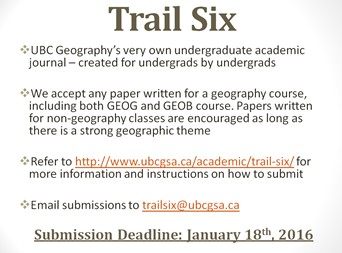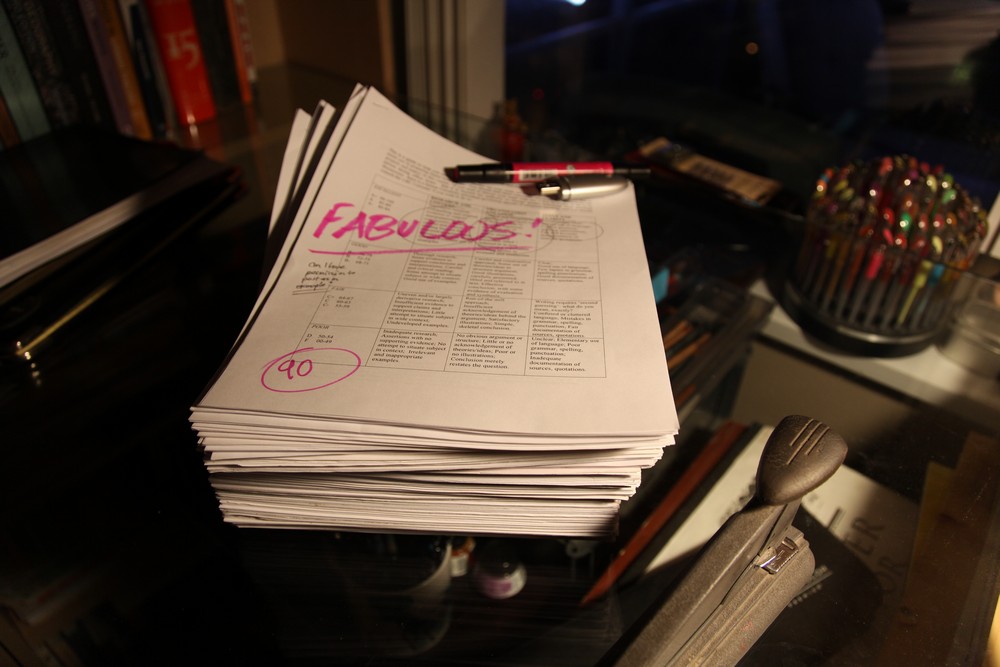

Examinations
...and projects and marks
Geography 350
Mid-term Examination
The mid-term examination will be held in-class on the date specified in the course outline. The exam will consist of approximately fifty multiple-choice questions drawn from the material we've covered up to that point in the semester. The questions will be based primarily on the lecture slides I show in class and make available to you. To prepare, read carefully through the slides and review the personal notes you've taken in class.
I try to make the mid-term fair, efficient, and reasonable in its level of difficulty. This allows you to put a good mark on the scoreboard early on, and to learn about the kinds of questions I ask. But if you do well on the mid-term, don't make the mistake of thinking that you're set, and you can just sit back, stop attending, and coast through the rest of the course with no further effort. The skills tested by a multiple-choice question are rather different from those evaluated in a written project or essay question.
I should also note that students often express dissatisfaction in the course evaluations that the mid-term examination does not include an essay component. Good point! There once was an essay section. But there were many complaints of insufficient time for both multiple-choice and essay parts of the exam. That's why the essay was dropped. Now I recommend you think about it this way: since the first project submission deadline is not long after the mid-term exam, consider your independent written project an essay component to the mid-term! Do the best job you can, and do not procrastinate -- take advantage of the first project submission opportunity.
Similarly, some students have expressed frustration that there is not a discussion section component to this course. Here's what one anonymous student wrote on the course evaluations a few years ago:
"I think that this class would benefit further from a discussion group .... The fact that the written project is worth 40% of the grade is also terrifying and I have found it made me procrastinate it more, because it needs to be one of the best essays I have ever written if I am to do well in this course."
These are valuable comments indeed. Unfortunately, UBC and Departmental regulations only allocate Teaching Assistant support for certain types of classes with specified enrollments (usually over 100); this means that we simply don't have the resources to enable a discussion section while covering all the required subject matter. But there's an easy way to build your own discussion section: come to office hours! Additionally, you can stay after class and we can chat as long as you'd like. Last year, at least five or six colleagues took me up on this offer at the end of lecture most days. We wound up having lots of wide-ranging discussions about many fascinating dimensions of geography, urban theory, and current events in cities around the world. And we also talked a lot about students' written project ideas. Dive in early, avoid procrastination, and you'll find it's exciting and enjoyable!
Written Projects
Written projects are evaluated for rigor, creativity, and originality; for more details on evaluations of research and content, organization and logic, and style and presentation, see this. You are also expected to follow the general guidelines in preparing written projects. Each of the project options includes a detailed background paper, which provides guidance and recommendations for how to approach a particular urban issue. If you can't find anything that interests you among the project options I've outlined, then you are free to strike out on your own to design your own project, paper, or essay. For ideas, look through various parts of the textbook and other recommended readings; glance through my research page; read through some of my random, disorganized brainstorming ideas. An evolving list of the things I've published is here. I'm happy to chat about alternative project ideas if you stop by my office hours. But, please, think carefully before casually firing off late-night emails right before the final deadline asking for precise step-by-step guidance on exactly what to do or assurance that if you do a certain thing, you'll get a good grade. You can't have it both ways. If you want detailed guidelines and recommendations, then choose one of the project options for which there is a written background paper and other resources. If you want the freedom to strike out on your own, then you'll have to take a bit more responsibility for defining the question, choosing a method, and undertaking a creative and rigorous analysis. I'm very happy to talk and brainstorm: but please do a bit of homework on your own first, and then contact me in a human or quasi-human fashion (face to face during office hours is best; a phone call is the next best substitute).
Final Examination
UBC's official Final Examination Period this year runs from Tuesday, December 3, 2019, to Wednesday, December 18, 2019. We won't know the date, time, or location for our final examination until it is announced by UBC's Exam Scheduling Office. Do not make travel arrangements until you know the details for our exam. Our final examination will be a standard-length UBC final: 2.5 hours.
Did you follow that link? ... back now? Hyperventilating? Your pulse racing?
Take a deep breath. Relax! UBC's Student Services also provides comprehensive recommendations and resources on how to achieve "Less Stress for Academic Success."
Think back to our very first days of class, back in those sunny days of September. Recall one of the key points I've been emphasizing: "Cities are based on trust, and so is this class."
So, here's what you can expect.
The exam will include between fifty and sixty multiple choice questions, and a selection of several essay questions. You will be expected to answer all of the multiple-choice questions, and to write an essay in response to one of the essay questions. The multiple-choice questions focus primarily but not exclusively on material discussed in class after the mid-term examination. There will be a few questions, therefore, from the early lectures in the class. The multiple choice questions are based primarily on the lecture notes as codified in the powerpoint files made available on the left-hand side of the "schedule" tab of the course website, but some questions may be drawn from the required readings.
The essay choices are drawn from material covered through the entire course. You should prepare for the multiple-choice section of the exam by studying the slides from my class presentations, and then skimming over the required readings from the textbook you've been using to prepare for each class.
Prepare for the essay question by choosing one topic and studying it in depth. Go beyond the written lecture notes, consulting relevant sections of the textbook as well as a few of the recommended readings. Don't try to memorize stuff for the essay question: to write a truly excellent essay, you need to analyze, synthesize, and critically evaluate the concepts, questions, and debates we've studied. For a good essay, the specific facts you remember are not as important as the logic, interpretation, and thought you use to put them all together. It is also the case that there is not a perfect relationship between the quantity and quality of the words written in an exam essay. Thimk. Work hard and prepare, but when you sit down to write, you have to trust yourself.
There will be no multiple-choice questions on material presented in guest lectures or films shown in class. To be sure, if you've taken good notes during the guest lectures, then you should study this material and consider integrating it into the essay question you choose to answer. But none of the required multiple choice questions will be based on the guest lectures.
Essay Questions
1. When and where did the first cities emerge? Why is this question important? What do the answers and debates on ancient cities tell us about methodology and epistemology?
2. How has the European 'Renaissance' shaped urban geography -- both the 'real' spaces and places of cities, and the way people have thought about urbanism?
3. Where and when is the "industrial city"? How does historical memory of the relationship between industrialism and urbanism influence contemporary debates over global development and underdevelopment?
4. What is positivism, and what does it have to do with how geographers have approached the study of cities? Is this a philosophy of the past, or does it continue to influence knowledge and policy today?
5. Is there such a thing as a "socialist city"? If so, what do socialist cities mean in the context of a worldwide urban system?
6. What are the continuities and divergences between urban geography's "urban system" heritage, with its central-place networks and hierarchies, and contemporary studies of globalization and world systems? What do the debates over contemporary world urban networks tell us about methodology and epistemology?
7. Is there such a thing as a "North American city?" (Why) is this question important? What, if anything, is distinctive about Canada's urban system, and the internal spatial organization of the Canadian metropolis?
8. Is an urbanizing world taking us to a future of growth and prosperity, a future of inequality and injustice, ... or both? Are innovations like microfinance the pathway to prosperity, or is the "poverty capital" described by Ananya Roy just the latest version of Rostow's modernization theory?
9. How do land markets and real estate reflect the political choices of economics and markets? How do the distinctive features of housing shape the metropolis? How have intra-urban theories of land use and housing been transformed by globalization and investment circuits?
10. Recall the geometric metaphors used in the "classical" models of urban social space: the concentric zones, the sectors, the multiple nuclei. Now think about the theories and debates we explored in the lectures on housing, the underclass, gentrification, and homelessness. What are the roles of spatial form (segregation, separation, change) and spatial process in reflecting and reproducing social relations?
Final Grades
...will eventually be posted here and then on the University's Faculty Service Center. Please note that the Calendar specifies: "Faculties, departments, and schools reserve the right to scale grades in order to maintain equity among sections and conformity to university, faculty, department or school norms. Students should therefore note that an unofficial grade given by an instructor might be changed by the faculty, department, or school. Grades are not official until they appear on a student's academic record." I hope this doesn't happen, but please note that if it does, it's completely out of my hands.
Papers that have been revised and resubmitted will be available during my office hours in January. Recall the marking policy specified in the course syllabus: if you waited until the end of the course to submit a project, it will be assigned a grade with no penalty. But these submissions will not received detailed comments or recommendations, and will not be returned. Recommendations and advice are reserved for those submissions received at the in-term deadlines specified in the syllabus.

CopyLeft 2019 Elvin K. Wyly
Except where otherwise noted, this site is
licensed under a Creative Commons Attribution 2.5 License
"The sun never sets on the British Empire because the British Empire is in the East and the sun sets in the West."
"The inhabitants of Moscow are called Mosquitoes."
"Nearly at the bottom of Lake Michigan is Chicago."
Quoted in Alexander Abingdon (1997). Herrings Go About the Sea in Shawls, And Other Classic Howlers from Classrooms and Examination Papers. New York: Viking, quotes from p. 49, 51, 28.
Overtown, Miami, November 2008 (Elvin Wyly)

Newark, New Jersey, June 2009 (Elvin Wyly)
General Grading Philosophy
Here is an anonymized worksheet of student grades for a previous offering of this course. If you look through the worksheet -- and if you use a few tricks of the trade in your preferred worksheet software to organize and analyze the data -- you can learn a fair bit about my grading practices.
First, I try to be fair but rigorous. Out of a total enrollment of 66 students, 17 earned marks in the "excellent" range as defined by University policy. While I wish I could give everyone an "A," doing so would completely destroy the meaning of this mark of distinction.
Second, if hard work and the investment of time are required, they are also recognized. In much of my own research, I am known for engaging with the philosophy of knowledge labeled as positivism; in teaching, advising, and assigning marks, however, I rely heavily on key principles in the humanist philosophy of idealism. What this means is that I acknowledge that your performance is not an objectified, discrete entity of metaphysical realism, awaiting discovery and quantification by the detached, neutral scientific observer: it is, instead, the mutual constitution of subject-object relations in a setting of historical and geographical contingency, a collaboratively-produced social construction of criteria for adjudicating claims to knowledge, expertise, creativity, value, and distinction. Yikes, that previous sentence was long and full of jargon! But the sixty-two words in that sentence are trying to summarize thoughts and discussions amongst scholars going back years, decades, and centuries (for summaries, see Barnes, 2009, Sharp, 2009, and Wyly, 2015). Some scholars devote entire careers to understanding the differences amongst philosophies of knowledge. And, in a way, that's my point: to really appreciate these questions requires a lot of time and effort. So does teaching and learning. Since students and professors in universities these days are always busy, nobody seems to have much time to read, think, and talk. Serious conversation and contemplation, therefore, have become almost impossible in large classes. So let me try a less pretentious explanation of the second part of my grading philosophy. In the best of all possible worlds, a professor is able to assign marks of excellence for the achievement that he/she helped to make possible. Or, to re-phrase it yet another way, everyone who invested time and effort was rewarded with as much recognition as possible. Of the 66 students in that class, 17 earned marks in the "excellent" or "A" range, while 26 earned marks in the area of "good" or "B."
Third, no matter how hard I try, I can't protect you from yourself. In areas of settled, established knowledge, failing grades provide efficient screening mechanisms: let's face it, some of us just aren't cut out for certain lines of work, and if we can't do the engineering calculations right, the bridge will fall down and people will die. In the humanities and social sciences, however, failing grades measure aspects of the process as well as the student outcome. Even so, there's only so much I can do to help. Note that only one final mark was assigned in the "poor" or "D" range -- and this in the case of a student who simply refused to submit one of the required projects. Teaching, learning, and scholarship are about enlightened, informed, conversation -- which can't happen if someone is completely silent, or walks away, or fails to plan ahead. (The all-time best case of procrastination I've ever seen involved a student who straggled into my office asking how to gain access to my lecture notes on the course web page -- two hours before the midterm exam.) Note also that more than one in ten students encountered some sort of impossible circumstance at the end of the course, and skipped the exam, refused to turn in one or more of the required projects, or both. For these cases I submitted "DNW" codes, which University regulations define as "Did Not Write," but could also be translated similar to a WTF? code. Some of the DNW codes on the faculty service center were accompanied by SD -- standing deferred -- but I do not have authority to enter this code myself. It's coded in by the academic advising professionals -- so if you find yourself in an impossible circumstances at the end of the semester, you should speak to someone in your faculty's advising office.
References
Barnes, Trevor J. (2009). "Positivism." In Derek Gregory, Ron Johnston, Geraldine Pratt, Michael J. Watts, and Sarah Whatmore, eds., The Dictionary of Human Geography, Fifth Edition. West Sussex, UK: Wiley-Blackwell, pp. 557-559.
Sharp, Jo (2009). "Idealism." In Derek Gregory, Ron Johnston, Geraldine Pratt, Michael J. Watts, and Sarah Whatmore, eds., The Dictionary of Human Geography, Fifth Edition. West Sussex, UK: Wiley-Blackwell, pp. 363-364.

UBC's Geography Students Association edits and publishes an annual scholarly journal, Trail Six. Keep them in mind as a possible publication outlet as you work on your final and revised term papers.
